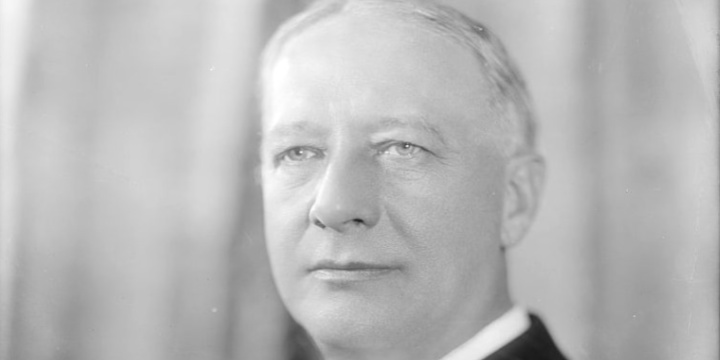Remembering Alfred E. Smith and the Jews
 by Harold Brackman
by Harold Brackman
President Franklin D. Roosevelt is still an icon to American Jews — despite extensively documented charges that he failed to act to help save Europe’s Jews.
In 1928, Al Smith became the first Roman Catholic nominated by a major party for the presidency, though he lost to Herbert Hoover.
Less known than it should be is that Smith was a hero to many Jews — and, according to biographer Robert A. Slayton, he harbored none of FDR’s ambivalence toward Jews.
Smith was born in 1873 on New York’s Lower East Side, in a tenement apartment overlooking the site of the not-yet-built Brooklyn Bridge. Never educated beyond the eighth grade, Smith joked that his alma mater was not Harvard, but the Fulton Fish Market.
“Progressive Era” reform politics began around 1900, and Smith — although a Tammany Hall machine politician and a Catholic — joined up. Smith won over Jews by supporting substantive reforms.
In the State Assembly, he guided through New York’s Worker Compensation Law, the first in the nation. Next came the terrible Triangle Shirtwaist Fire of 1911, in which 146 women died. Smith spearheaded the investigatory commission that reformed fire safety and labor laws. He forged lifelong ties to Jewish politicians and labor leaders during these times.
In Albany — now the state’s governor — Smith sponsored laws to benefit women and protect children, built low-cost housing, and created the state park system. Before FDR became famous for his intellectual “Brain Trust,” Smith had his own, featuring three Jews: publicist Belle Moskowitz, Judge Joseph Proskauer, and city planner Robert Moses. Old Irish politicians disdainful of Jews sang: “And now the brains of Tammany Hall … are Moskie and Proskie and Mo-ses!” But Smith didn’t care.
While losing badly to Herbert Hoover nationally, Smith carried many big cities where Catholics and Jews voted for him. They continued to vote Democrat. Previously, in 1924, Smith won the hearts of American Jews when he sponsored the resolution demanding that the Democratic Party denounce the Ku Klux Klan.
In 1928, Massena, in upstate New York, experienced the first “blood libel” hysteria in American history. The police even interrogated the local rabbi on the eve of the Day of Atonement. Smith not only denounced the blood libel, but he worked with the new National Conference of Christians and Jews, and disciplined state police officers who were anti-Jewish.
Al Smith could not get over that he lost New York state in the 1928 presidential race, while his protégé FDR won the governorship. During the New Deal of the 1930s, Smith supported the anti-Roosevelt American Liberty League — yet he also spoke up loudly and often against Hitler. Wiped out by 1929’s Wall Street crash, Smith had to work promoting the new Empire State Building project.
Franklin Roosevelt, in nominating Al Smith for president in 1924, had called him “The Happy Warrior.” Vanquished in presidential politics during the 1920s, Smith nevertheless deserves praise to this day for battling for tolerance and democracy, and supporting the rights of minorities and Jews.
Historian Harold Brackman is coauthor with Ephraim Isaac of From Abraham to Obama: A History of Jews, Africans, and African Americans (Africa World Press, 2015).
 Iran Sentences Rapper Toomaj Salehi to Death Over 2022-23 Unrest
Iran Sentences Rapper Toomaj Salehi to Death Over 2022-23 Unrest Netanyahu: ‘Antisemitic Mobs Have Taken Over Leading U.S. Universities’
Netanyahu: ‘Antisemitic Mobs Have Taken Over Leading U.S. Universities’ U.S. Decides Against Sanctions on IDF’s Netzah Yehuda Battalion
U.S. Decides Against Sanctions on IDF’s Netzah Yehuda Battalion Israel Says It Is Poised to Move on Rafah
Israel Says It Is Poised to Move on Rafah Israeli Hostage Hersh Goldberg-Polin Seen Alive in a New Hamas Video
Israeli Hostage Hersh Goldberg-Polin Seen Alive in a New Hamas Video Palestinian Prime Minister Announces New Reform Package
Palestinian Prime Minister Announces New Reform Package France: Man Suspected of Abducting, Raping Jewish Woman ‘to Avenge Palestine’
France: Man Suspected of Abducting, Raping Jewish Woman ‘to Avenge Palestine’ Israel Intensifies Strikes Across Gaza, Orders New Evacuations in North
Israel Intensifies Strikes Across Gaza, Orders New Evacuations in North Iran Threatens to Annihilate Israel Should It Launch a Major Attack
Iran Threatens to Annihilate Israel Should It Launch a Major Attack ‘Completely Baseless’: Reports of Mass Graves at Gaza Hospitals are False, IDF Says
‘Completely Baseless’: Reports of Mass Graves at Gaza Hospitals are False, IDF Says




 Israeli Hostage Hersh Goldberg-Polin Seen Alive in a New Hamas Video
Israeli Hostage Hersh Goldberg-Polin Seen Alive in a New Hamas Video Israel Says It Is Poised to Move on Rafah
Israel Says It Is Poised to Move on Rafah U.S. Decides Against Sanctions on IDF’s Netzah Yehuda Battalion
U.S. Decides Against Sanctions on IDF’s Netzah Yehuda Battalion Netanyahu: ‘Antisemitic Mobs Have Taken Over Leading U.S. Universities’
Netanyahu: ‘Antisemitic Mobs Have Taken Over Leading U.S. Universities’ Iran Sentences Rapper Toomaj Salehi to Death Over 2022-23 Unrest
Iran Sentences Rapper Toomaj Salehi to Death Over 2022-23 Unrest